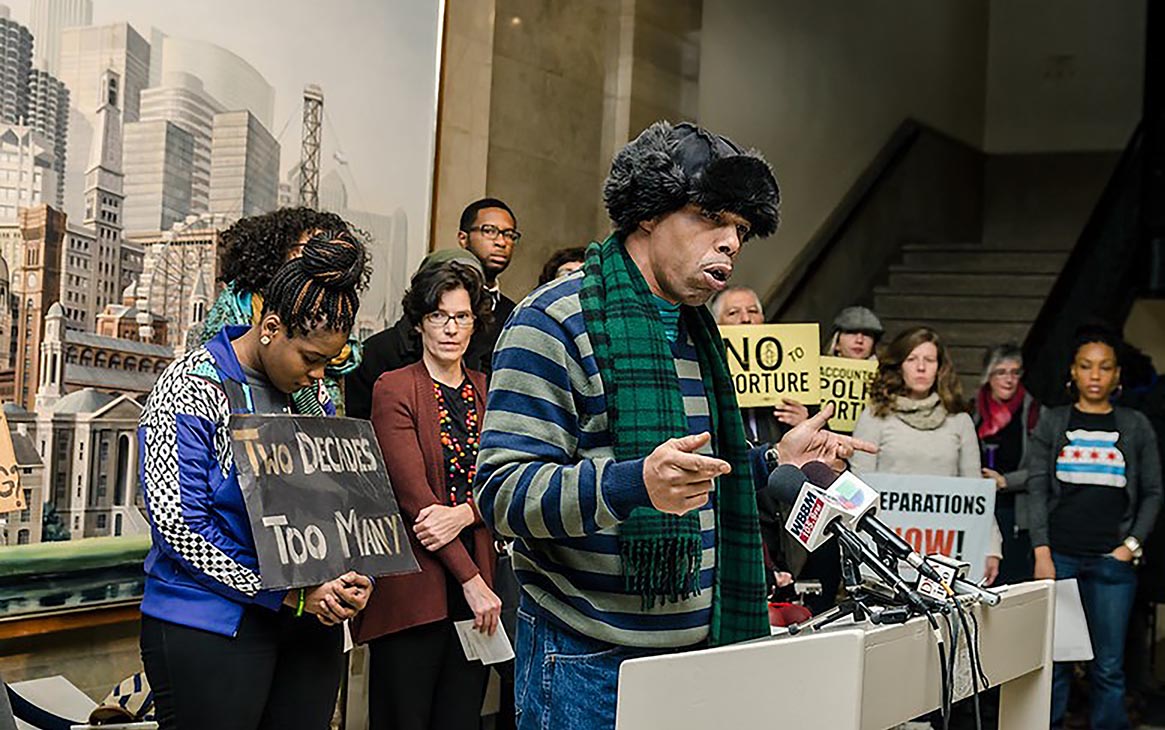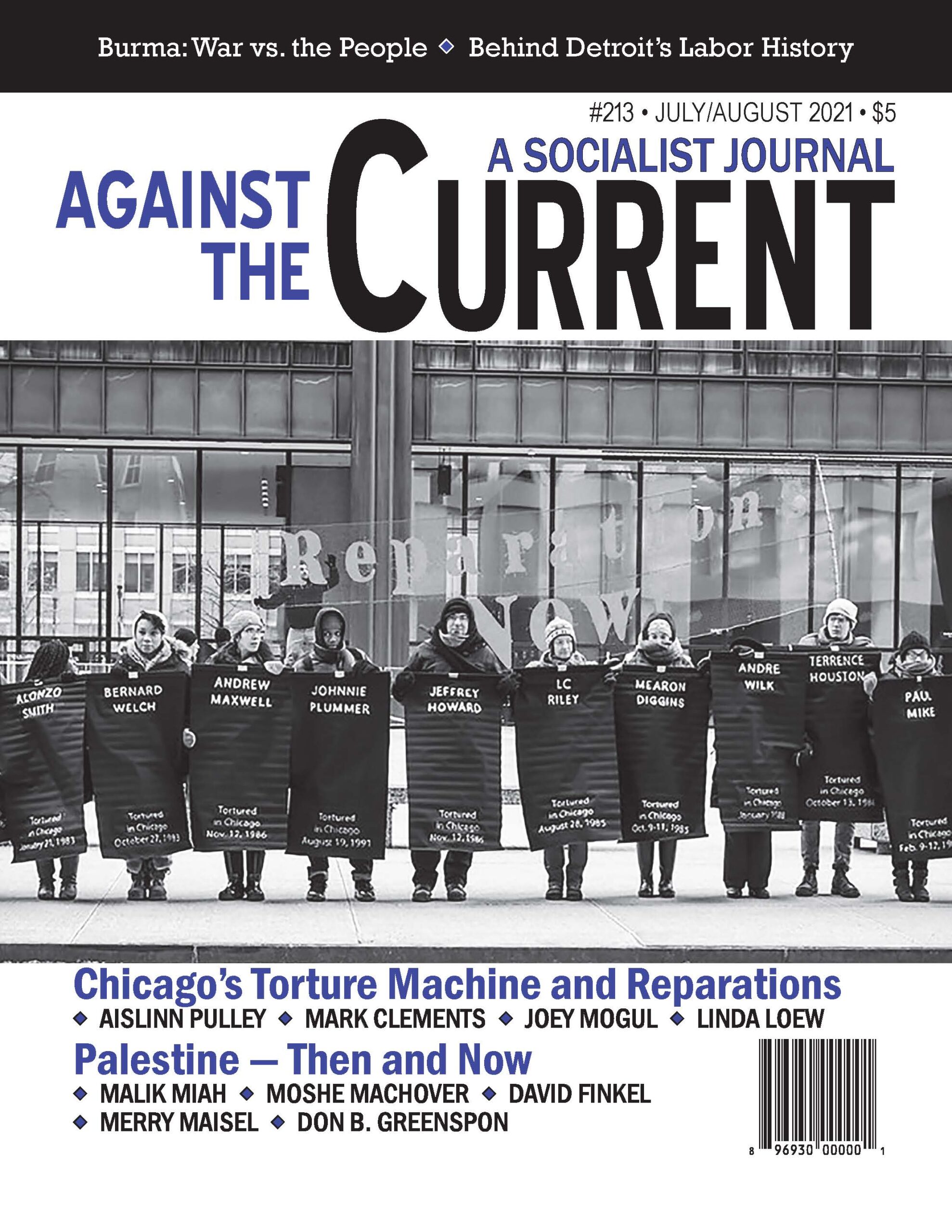Against the Current No. 213, July/August 2021
-
Infrastructure: Who Needs It?
— The Editors -
Burma: The War vs. the People
— Suzi Weissman interviews Carlos Sardiña Galache -
Afghanistan's Tragedy
— Valentine M. Moghadam -
The Detroit Left & Social Unionism in the 1930s
— Steve Babson - On the Left and Labor’s Upsurge: A Few Readings from ATC
-
Detroit: Austerity and Politics, Part 2
— Peter Blackmer - Chicago's Torture Machine
-
Reparations for Police Torture
— interview with Aislinn Pulley - Diana Ortiz ¡presente!
-
A Torture Survivor Speaks
— interview with Mark Clements -
Torture, Reparations & Healing
— interview with Joey Mogul -
The Windy City Torture Underground
— Linda Loew - Palestine -- Then and Now
-
Palestinian Americans Take the Lead
— Malik Miah -
Zionist Colonization and Its Victim
— Moshé Machover -
Conceiving Decolonization
— David Finkel -
Not a Cause for Palestinians Only
— Merry Maisel -
When Liberals Fail on Palestine
— Donald B. Greenspon - Reviews
-
Immigration: What's at Stake?
— Guy Miller -
Exploring PTSD Politics
— Norm Diamond -
A Life of Struggle: Grace Carlson
— Dianne Feeley -
Living in the Moment
— Martin Oppenheimer
interview with Mark Clements

MARK CLEMENTS, A survivor of the Chicago Police torture ring, was interviewed by Linda Loew and Dianne Feeley for Against the Current on May 17, 2021.
Linda Loew: As a torture survivor, what are your thoughts about the reparations campaign?
Mark Clements: Reparations was a great achievement. However, absent jobs, healthcare and housing, that ordinance still remains inadequate for sustaining someone’s life.
It took a lot to achieve reparations but there was no true acknowledgement by the Cook County State’s Attorney, who at that time was Anita Alvarez. I wanted an official letter written to prosecutors, asking that they consider dropping cases where torture had occurred.
I also felt that the apology should be at a ceremony where the mayor would issue an apology directly to the torture survivors, to their families, and to the Chicago community. Instead it was issued while we were still roaming the hallways of City Hall.
Until the agreement was reached, I fought against it. I fought against it because I believe if you don’t have a way to sustain yourself from A until Z, something’s going to fali.
All these houses in Englewood, Roseland, Chatham communities that lay vacant could have been fixed up by the city and given to torture survivors. That way, when guys were released from prison they would have had a head start. As well, they should have been promised a job through the city of Chicago.
What I asked was: what are people going to do two, three years down the road? While the ordinance was a great accomplishment, and I don’t want to take away from that, the city council didn’t realistically think through the problem over the long haul.
They rejected the demands for housing and jobs. It’s a psychological game. If you wave money in front of people’s faces, they’re going to snatch it, and that’s exactly what happened.
I think 70+% of torture survivors are jobless and homeless today. Many are suffering from the effect of their torture and incarceration. When it’s survival out here and you want to repair someone, you’ve got to make them equal again. The only way you’re going to make them equal is when a person has a place to stay and a way to sustain themselves — a lot of people don’t look at that.
Another problem was that there was only a 90-day timetable for recognized torture survivors to apply for their monetary compensation. That means only 57 survivors — all men — were certified. We have since located at least three women who were tortured; none of them were eligible.
They should not have put a timetable on when a person could seek reparation. It should have remained open. They gave approximately a 90-day apply process. From that point on, they gave those 57 people reparations.
Dianne Feeley: How has the Chicago Torture Justice Center attempted to meet the needs of the torture survivors and their families?
MC: The survivors made the decision to open it up to everyone and not limit what it can offer because so many people are impacted by police crime.
What we tried to do is to look back upon our own experience and use that as a guide to help our brothers and sisters. It’s been a tough challenge, but it has worked for many who have been released from the Illinois Department of Corrections (IDOC).
After all, when prisoners return home they have to figure out “how am I going to get my ID, my birth certificate, my social security card? With my record, how can I get a place to live or a job?”
Most of these guys have been locked up under about the worst of the worst conditions imaginable, and there are going to be psychological effects that linger on.
The Mothers’ Legacy
The Center’s existence is primarily due to our mothers, many of whom have since passed on. It’s a way to further their legacy. It’s the shell of their body upon this earth. I just keep it 100, as the kids say. Had I not had a little old mother, I would still be in prison.
They did a great job along with torture survivors, as well as with the community. Primarily, it was done through the Freedom School, BYP100 (Black Youth Project) and Mariame Kaba as well as various other organizations that played a role.
A lot of people fail to realize that having a child in prison is a form of slavery. Mothers had to either abandon their jobs or else abandon their children. Their kids would not be free if they had not attended meetings and news conferences.
Even today, the media still protects the so-called legacy of Jon Burge despite the fact that he was a torturer, a thug and a criminal. We may say that during a news conference but you don’t really hear the reporters repeating it. A lot of people seem not to understand we have a corporate dictatorship when it comes to media.
I go to a lot of legislative meetings and court hearings — although with the pandemic, they are all on Zoom. If I were governor, we wouldn’t even need legislation. I would just sign an executive order. “Everyone who served 10 years and one day, you’re released.” I would empty our prison systems out and pour money into their communities.
It seems like every time there’s a murder in the Black and brown community, it’s guaranteed that a lawmaker claims he can fix the problem. He fixes it by increasing the sentence upon a penalty.
Penalties don’t deter crime. If crime could be deterred with a penalty, there would be no crime in states where there’s still a death penalty. What we need is restorative justice.
DF: What do you see as elements of restorative justice?
MC: Restorative justice is having a person acknowledge their crimes to society and seeking ways to give back to society. Restorative justice to me looks like an opportunity to give back to the young kids in the community. Now being a part of this organization, which is about restorative justice, I’m going to mentor you to stay out of the prison system.
Giving back should not mean absent jobs, absent proper education, absent an opportunity to sustain your life. Restorative means trying to put you on an equal playing field with all of society. Unfortunately, we have residents who don’t believe that theory.
Healing is key. The only way healing is going to come is with dollars being invested by the state, city and county into programs that concretely help. People are hurting. I believe crime occurs because people need jobs — not just minimum wage ones so they have to work two or three jobs.
LL: You have emphasized the role of the mothers of torture survivors, including your own. What has been the role of the larger community?
MC: Protests have made a big difference and they continue to do so today in this time of COVID. That’s how Gerald Reed was recently freed. Continuing to put pressure on the governor during COVID has reduced the Illinois prison system from 47,000 to where it is now, at 27,000.
COVID was an invisible weapon, a form of torture for those languishing behind bars. If we stop protesting we’re in trouble! We face systemic issues because the government stripped services away from poor people’s communities.
Hopefully, in 10 years or so, we may have a little sky open. As I say, that’s when we run through that opening.
July-August 2021, ATC 213

